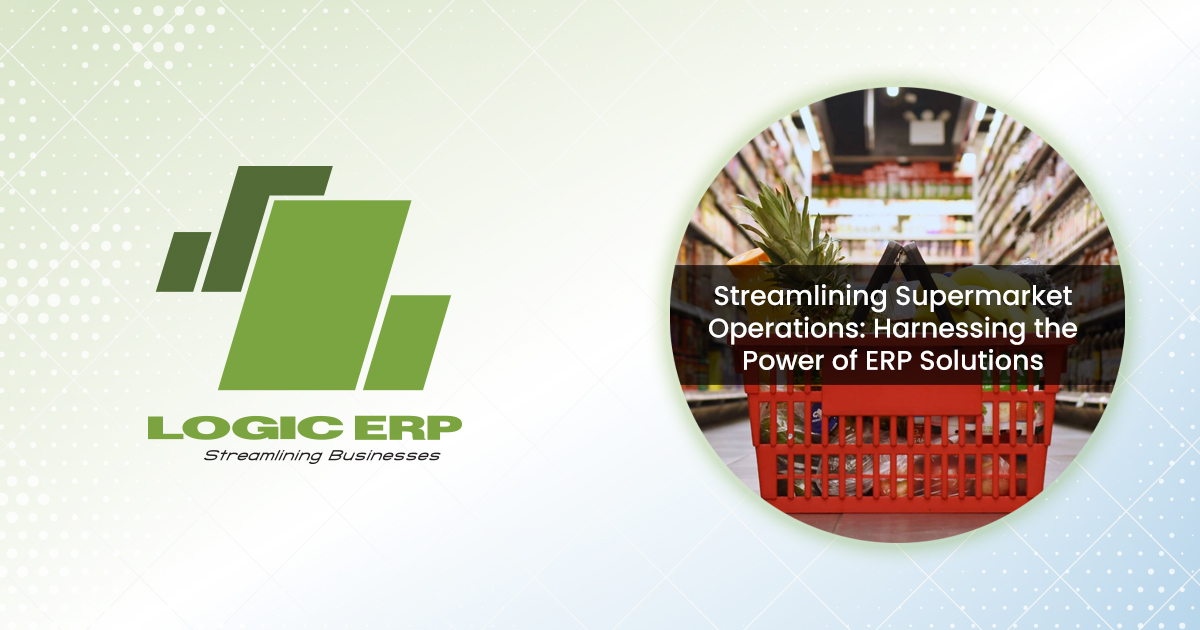

The retail industry is steadily growing. Despite this growth, supermarkets continue to grapple with operational challenges ranging from inventory management and payment processing to supply chain coordination and customer service. The intricacies of running a successful supermarket necessitate a comprehensive approach, and Enterprise Resource Planning (ERP) systems have emerged as a powerful solution to address these challenges. In this blog, we will delve into the advantages of Supermarket Software and explore how they can revolutionize your business operations.
Understanding ERP Systems
An ERP, or Enterprise Resource Planning, system is a software solution designed to assist companies in managing and integrating their core business processes. It facilitates increased productivity and profitability by automating various tasks and facilitating the seamless flow of information across different departments within an organization. ERP systems encompass a wide range of functions, including accounting, auditing, project management, procurement, supply chain operations, risk management, enterprise performance management, and compliance. Moreover, they can be tailored to suit the specific needs of each organization.
Key Benefits of ERP Systems for Supermarkets
-
Comprehensive Inventory Management
Efficiently managing inventory is crucial for the smooth operation of a supermarket. Inventory management software helps to optimize their stock levels, monitor products in real time, and automate reordering processes. By integrating tools such as barcode scanners and point-of-sale systems, supermarkets gain enhanced visibility into their inventory, minimizing overstocking or running out of stock. Additionally, forecasting and demand planning tools within ERP systems help anticipate customer preferences, reduce wastage, and maintain optimal stock levels.
-
Efficient Supply Chain Management
Supermarkets rely on a complex network of suppliers, distributors, and logistics partners to keep their shelves stocked. ERP systems are designed to streamline the entire supply chain management process, providing real-time visibility into the movement of goods. Integration with various stakeholders, including suppliers and transportation companies, enables informed decision-making. With up-to-date information on inventory levels, delivery schedules, and demand fluctuations, supermarkets can respond promptly to market changes, ensuring products are available when and where they are needed. This integration improves communication, reduces errors, and enhances overall supply chain efficiency.
-
Enhanced Point-of-Sale (POS) Functionality
The checkout process is a crucial touchpoint for delivering exceptional customer experiences at supermarkets. Supermarket POS Software allows supermarkets to offer flexible and secure payment methods, such as cards, bank transfers, mobile payments, and cash. This seamless integration streamlines business operations and accommodates customer preferences, resulting in a convenient and efficient checkout experience.
-
Analytics and Reporting
To remain competitive, supermarkets must rely on data-driven decision-making. ERP systems provide robust analytics and reporting capabilities that offer actionable insights from supermarket data. These insights can be used to identify opportunities for improvement, optimize pricing strategies, pinpoint top-performing products, and make informed business decisions. Furthermore, personalized promotions, tailored discounts, and targeted marketing campaigns can be launched to enhance customer satisfaction and foster loyalty.
-
Streamlined Financial Management
Efficient financial management is a cornerstone of supermarket operations. ERP systems offer integrated financial management modules that automate essential accounting processes, such as accounts payable, accounts receivable, and general ledger management. By centralizing financial data, supermarkets ensure accurate and timely financial reporting, streamline auditing processes, and maintain compliance with regulatory requirements. Additionally, ERP solutions enable efficient management of payroll, tax calculations, and vendor payments, reducing administrative burdens and enhancing overall financial efficiency.
Conclusion
In today’s fiercely competitive retail landscape, supermarkets and grocery stores must leverage modern technology to optimize operations and enhance customer experiences. LOGIC ERP Software specifically address the challenges faced by supermarkets, ranging from inventory management to supply chain coordination and customer engagement. By implementing an ERP system, your supermarket can streamline processes, gain real-time visibility into operations, and make data-driven decisions that drive efficiency, profitability, and customer satisfaction. Embrace the power of ERP solutions to revolutionize your supermarket’s operations and stay ahead in the dynamic retail industry.

